 This is a rather banal event: Jesus sends two or three disciples before him in order to prepare the place of his rest for the night. But this event, though banal, has a very important significance: it has an eschatological sense, that is to say a sense which concerns the realities of the world to come. “He set his face to go to Jerusalem.” Jesus orients himself directly toward the holy city, Jerusalem, the terrestrial city that is the sign and the symbol of the celestial city, the city of the Great King of the Universe! Saint John, in his Revelation, saw the city of Heaven and it appeared to him as the city of Jerusalem: “I saw the holy city, new Jerusalem, coming down out of heaven from God…”
This is a rather banal event: Jesus sends two or three disciples before him in order to prepare the place of his rest for the night. But this event, though banal, has a very important significance: it has an eschatological sense, that is to say a sense which concerns the realities of the world to come. “He set his face to go to Jerusalem.” Jesus orients himself directly toward the holy city, Jerusalem, the terrestrial city that is the sign and the symbol of the celestial city, the city of the Great King of the Universe! Saint John, in his Revelation, saw the city of Heaven and it appeared to him as the city of Jerusalem: “I saw the holy city, new Jerusalem, coming down out of heaven from God…” ” Another said, «I will follow you, Lord; but let me first say farewell to those at my home.» Jesus said to him, «No one who puts his hand to the plow and looks back is fit for the kingdom of God.» “
” Another said, «I will follow you, Lord; but let me first say farewell to those at my home.» Jesus said to him, «No one who puts his hand to the plow and looks back is fit for the kingdom of God.» “Once we meet Christ, only one thing is and must be important for us: to accomplish the mission which he confided in us! Yes, he who meets Christ in his life, through the calling of grace, must imitate Saint Paul, when he said: “But one thing I do, forgetting what lies behind and straining forward to what lies ahead, I press on toward the goal for the prize of the upward call of God in Christ Jesus!” Surely, only the future must count for us! What we are going to do for Christ, what we accomplish today to proclaim the kindgom of God in all aspects of our life, this is what is important, this is what gives our life on earth all its meaning!
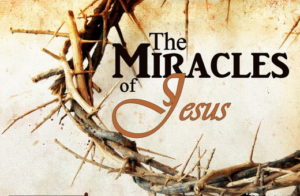 God takes care of us through his Providence! In order that the Sacrament of the Body and Blood of his Son might be worthily honored throughout the world, God did not hesitate to employ the services of a simple nun, whose life was filled with trials of all kinds, but also, above all, with graces without number! God makes use of poor and humble means in order to make his glory shine forth and to manifest to the men of this world his immense Love! The Providence of God does not do anything ostentatiously: it provides for a simple, almost trivial, means, but one that will serve man in accomplishing great things for the Glory of God! And thus it is with the Sacrament of the Eucharist: on every day made by God, there is a priest to repeat, among you, at the altar of the Lord, the words with which Jesus makes himself present under the sensible signs of the bread and wine, the bread and wine that Divine Providence itself places in our hands…
God takes care of us through his Providence! In order that the Sacrament of the Body and Blood of his Son might be worthily honored throughout the world, God did not hesitate to employ the services of a simple nun, whose life was filled with trials of all kinds, but also, above all, with graces without number! God makes use of poor and humble means in order to make his glory shine forth and to manifest to the men of this world his immense Love! The Providence of God does not do anything ostentatiously: it provides for a simple, almost trivial, means, but one that will serve man in accomplishing great things for the Glory of God! And thus it is with the Sacrament of the Eucharist: on every day made by God, there is a priest to repeat, among you, at the altar of the Lord, the words with which Jesus makes himself present under the sensible signs of the bread and wine, the bread and wine that Divine Providence itself places in our hands… Full of compassion and benevolence for these admirable people, who had faith and hope in the eternal Life that he had come to proclaim to them, Jesus lifts up his eyes to heaven and blesses the loaves and the two fish. As he looks towards the Father, Jesus already sees all those who will one day be at his side in the Kingdom, and he prays for them. It is in this spirit that the Lord multiplies the loaves and the fish by blessing them… Everyone ate until they were full, and what remained of the food filled twelve baskets. One basket for each apostle! It is as if Jesus had said to his disciples: “Do not be afraid! I am watching over you! Providence is with you! Faithfully carry out your mission – which is my mission – and I will provide for all your needs!”
Full of compassion and benevolence for these admirable people, who had faith and hope in the eternal Life that he had come to proclaim to them, Jesus lifts up his eyes to heaven and blesses the loaves and the two fish. As he looks towards the Father, Jesus already sees all those who will one day be at his side in the Kingdom, and he prays for them. It is in this spirit that the Lord multiplies the loaves and the fish by blessing them… Everyone ate until they were full, and what remained of the food filled twelve baskets. One basket for each apostle! It is as if Jesus had said to his disciples: “Do not be afraid! I am watching over you! Providence is with you! Faithfully carry out your mission – which is my mission – and I will provide for all your needs!”On this day, let us all receive the Bread of Life! Let us all be Apostles of Jesus Christ! Let us proclaim the Kingdom of God and entrust our life as well as all who are dear to us to the Providence of God! God takes care of us like a Father! Even more so, he takes care of us like a Mother, for he gave us the Mother of his Son Jesus: Mary is our Mother in Heaven! Let us also ask her to watch over us and to give us today the eternal Life that is in Jesus her Son, along with that little bit more that only a Mother can have in her heart, to which she witnesses in order to please her children!
 Each time we make the sign of the cross, as we did at the beginning of this celebration, we say: “In the name of the Father, and of the Son, and of the Holy Spirit.” But do we truly understand what we are saying? I do not believe so… The reason for this is that the Father, the Son, and the Holy Spirit we invoke constitute what we must call a Mystery: the Mystery of the Most Holy Trinity. Now, a mystery is precisely something that one does not understand. This does not mean that we are unable to express anything at all concerning this reality; on the contrary, we are able, thanks to what Jesus told us, to describe this mystery a little and to grasp it through comparisons and images.
Each time we make the sign of the cross, as we did at the beginning of this celebration, we say: “In the name of the Father, and of the Son, and of the Holy Spirit.” But do we truly understand what we are saying? I do not believe so… The reason for this is that the Father, the Son, and the Holy Spirit we invoke constitute what we must call a Mystery: the Mystery of the Most Holy Trinity. Now, a mystery is precisely something that one does not understand. This does not mean that we are unable to express anything at all concerning this reality; on the contrary, we are able, thanks to what Jesus told us, to describe this mystery a little and to grasp it through comparisons and images. We, too, when we give thanks (render grace) to the Lord when it enters into us under the species of the bread and wine, we prove to him all of our love, and the grace of God becomes, for us, “charity”! All of us are then but one Body of Christ in the Love of God! As Saint Paul says in today’s epistle: “Hope does not disappoint us, because God’s love has been poured into our hearts through the Holy Spirit which has been given to us.”
We, too, when we give thanks (render grace) to the Lord when it enters into us under the species of the bread and wine, we prove to him all of our love, and the grace of God becomes, for us, “charity”! All of us are then but one Body of Christ in the Love of God! As Saint Paul says in today’s epistle: “Hope does not disappoint us, because God’s love has been poured into our hearts through the Holy Spirit which has been given to us.”With the Most Blessed Virgin Mary, the Mother of God and the Mother of the Church, let us give thanks to the thrice holy God: the Father, the Son, and the Holy Spirit! May we all, through Mary and with Her, have in our hearts some of the joy and love of God the Trinity!
 How is this possible? Is it true? Do we not see, on the contrary, that evil reigns everywhere around us? Is the world not filled with violence, lies, and impurity? How then can the world be at the service of God, who is Spirit? Precisely for the simple reason that God is Spirit. That which is spirit cannot be seen. Thus we do not see, with the eyes of the body, in what manner the world belongs to God, who is Spirit. What captures our attention is the evil that we do see.
How is this possible? Is it true? Do we not see, on the contrary, that evil reigns everywhere around us? Is the world not filled with violence, lies, and impurity? How then can the world be at the service of God, who is Spirit? Precisely for the simple reason that God is Spirit. That which is spirit cannot be seen. Thus we do not see, with the eyes of the body, in what manner the world belongs to God, who is Spirit. What captures our attention is the evil that we do see.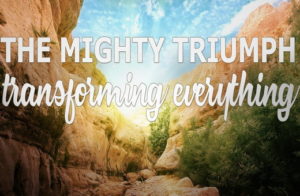 In the Eucharistic celebration, the words of the Lord on the evening of Easter take on a universal meaning, a dimension which extends to all the People of God. For, while only bishops and priests can forgive sins in the name of the Lord, on the other hand, any Christian can take part in the Eucharistic Sacrifice and offer himself with Christ for the Church and for the Redemption of the world, according to the instruction of Saint Peter, who said: “Come to him, to that living stone, rejected by men but in God’s sight chosen and precious; and like living stones be yourselves built into a spiritual house, to be a holy priesthood, to offer spiritual sacrifices acceptable to God through Jesus Christ.”
In the Eucharistic celebration, the words of the Lord on the evening of Easter take on a universal meaning, a dimension which extends to all the People of God. For, while only bishops and priests can forgive sins in the name of the Lord, on the other hand, any Christian can take part in the Eucharistic Sacrifice and offer himself with Christ for the Church and for the Redemption of the world, according to the instruction of Saint Peter, who said: “Come to him, to that living stone, rejected by men but in God’s sight chosen and precious; and like living stones be yourselves built into a spiritual house, to be a holy priesthood, to offer spiritual sacrifices acceptable to God through Jesus Christ.”There is no doubt about it: if the Holy Spirit is in the world to drive evil out of it, each one of us is called to collaborate in his divine action of regeneration and salvation! Let us not forget: each one of us is called by God to become a new creature in the Spirit. It will be possible to realize this only if we work to drive out the evil which is in the world, and which is therefore also in us. Let us turn our eyes to Mary, who is the new creation par excellence, the New Eve! For, through grace, and in order that she might come to our aid, Mary was already free from every sin from the very moment of her conception: She is the Immaculate Conception! Ever since the Incarnation of the Son of God, Mary collaborates in the action of the Holy Spirit: let us ask her to help us become – if only a little – like her!
 The words of this Sunday’s Gospel were spoken by Jesus just before his first departure to Heaven: the “departure” that he accomplished on the wood of the Cross. Jesus teaches his disciples, he prepares them for the coming separation; above all, he prepares them for a better future! For his “departure” will be beneficial to all! But, in order for this future to be better, there is a condition: we must love Jesus! If we love Jesus, then the Father will enter into us, and the Son as well, and also the Holy Spirit! “If a man loves me, he will keep my word, and my Father will love him, and we will come to him and make our home with him.”
The words of this Sunday’s Gospel were spoken by Jesus just before his first departure to Heaven: the “departure” that he accomplished on the wood of the Cross. Jesus teaches his disciples, he prepares them for the coming separation; above all, he prepares them for a better future! For his “departure” will be beneficial to all! But, in order for this future to be better, there is a condition: we must love Jesus! If we love Jesus, then the Father will enter into us, and the Son as well, and also the Holy Spirit! “If a man loves me, he will keep my word, and my Father will love him, and we will come to him and make our home with him.” Ever since the day of Pentecost, the Holy Spirit is here, on earth, to guide the Church of God in order that the message of Christ might be faithfully preserved and transmitted, from generation to generation, by means of both the Holy Scriptures and the Eucharist. Founded on the faith of the Apostles, the Christians of every age, like you and me, are called by the Holy Spirit to put their faith in the words of the Lord. Then, the Father will come, and Jesus with him: all will be but one in God and the Peace of the Lord will reign everywhere! “Peace I leave with you; my peace I give to you; not as the world gives do I give to you. Let not your hearts be troubled, neither let them be afraid.”
Ever since the day of Pentecost, the Holy Spirit is here, on earth, to guide the Church of God in order that the message of Christ might be faithfully preserved and transmitted, from generation to generation, by means of both the Holy Scriptures and the Eucharist. Founded on the faith of the Apostles, the Christians of every age, like you and me, are called by the Holy Spirit to put their faith in the words of the Lord. Then, the Father will come, and Jesus with him: all will be but one in God and the Peace of the Lord will reign everywhere! “Peace I leave with you; my peace I give to you; not as the world gives do I give to you. Let not your hearts be troubled, neither let them be afraid.”If there is a model of faith that we should all imitate, it is Mary, the Mother of God and the Wife of the Holy Spirit. Let us ask her to nurture in us the virtue of faith, as well as the virtues of hope and charity. Thus, through Mary, the kingdom of God the Father will spread throughout the world and the Peace of the Lord will be shared by all nations! Amen!
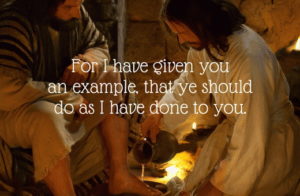 The “new life” that the Scripture speaks of is also referred to as “conversion”, a turning round. It means a radical change of vision, of our priorities in life. It means new attitudes, new values, new standards of relating with God and with people and indeed with our whole living environment of which we are a synergistic part.
The “new life” that the Scripture speaks of is also referred to as “conversion”, a turning round. It means a radical change of vision, of our priorities in life. It means new attitudes, new values, new standards of relating with God and with people and indeed with our whole living environment of which we are a synergistic part. The word “love”, of course, can lead to misunderstandings. The word is used by us mainly in contexts which imply deep affection, emotional attraction and a good feeling when the beloved is around or even just thought of. That is not quite the meaning of the word in this context.
The word “love”, of course, can lead to misunderstandings. The word is used by us mainly in contexts which imply deep affection, emotional attraction and a good feeling when the beloved is around or even just thought of. That is not quite the meaning of the word in this context.This is not, strictly speaking, love in the mutual or romantic sense. Rather, it implies a reaching out to others in a caring attitude for their wellbeing, irrespective of whether there will be a similar response by the other. It is the compassion that Jesus shows for the sinner and the evil person. It would be difficult for me to love a Hitler, a Stalin, a serial rapist killer or child abuser in the first sense. It would have no meaning and Jesus does not expect me to create such an artificial attitude.
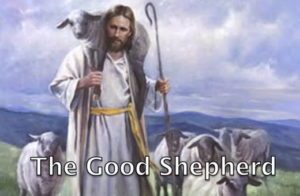 Today, the sheep of the Lord are the sheep of Peter, who continues to watch over his flock, acting in the person of his Successor: the Pope. Today, the risen Jesus is in Heaven, in the glory and splendor of the Father, he and the Father sending the Spirit of Love and Peace to the entire world. The Holy Spirit teaches all who truly allow themselves to be taught, he reminds them of all that Jesus said to his disciples while he lived on the earth: “The Holy Spirit, whom the Father will send in my name, he will teach you all things, and bring to your remembrance all that I have said to you.” But, in the benevolence of the Father, who loves Simon Peter as a son, the Holy Spirit teaches the sheep of Christ through the intermediary of Peter himself: the sheep of Christ, who are now the sheep of Peter, hear the voice of the Lord by listening to the breath of the Spirit, in obedience to the words of Peter and his Successors!
Today, the sheep of the Lord are the sheep of Peter, who continues to watch over his flock, acting in the person of his Successor: the Pope. Today, the risen Jesus is in Heaven, in the glory and splendor of the Father, he and the Father sending the Spirit of Love and Peace to the entire world. The Holy Spirit teaches all who truly allow themselves to be taught, he reminds them of all that Jesus said to his disciples while he lived on the earth: “The Holy Spirit, whom the Father will send in my name, he will teach you all things, and bring to your remembrance all that I have said to you.” But, in the benevolence of the Father, who loves Simon Peter as a son, the Holy Spirit teaches the sheep of Christ through the intermediary of Peter himself: the sheep of Christ, who are now the sheep of Peter, hear the voice of the Lord by listening to the breath of the Spirit, in obedience to the words of Peter and his Successors! Saint Augustine spoke in the following way to those in his care, as he held the Eucharist in his hands: “Be what you see, and receive what you are.” In saying this, he associated the concept of the Body of Christ with the concept of the Mystical Body of Christ: the Church. “Be what you see”: become similar to Christ whom you see under the appearances of bread and wine. “Receive what you are”: receive the Eucharist in order to be – even more so – the Body of Christ, receive what you already are to a certain extent: the Church. Saint Augustine, and Saint Peter before him, could also have said: “No one shall snatch them out of my hand.” For both of them held in their hand the Body of Christ, but also his Mystical Body: the Church! Both of them could have said in all truth, in the past as in the present: “No one shall snatch them out of my hand.” For, in holding the Eucharist, they had in their hand the sheep of the Lord!
Saint Augustine spoke in the following way to those in his care, as he held the Eucharist in his hands: “Be what you see, and receive what you are.” In saying this, he associated the concept of the Body of Christ with the concept of the Mystical Body of Christ: the Church. “Be what you see”: become similar to Christ whom you see under the appearances of bread and wine. “Receive what you are”: receive the Eucharist in order to be – even more so – the Body of Christ, receive what you already are to a certain extent: the Church. Saint Augustine, and Saint Peter before him, could also have said: “No one shall snatch them out of my hand.” For both of them held in their hand the Body of Christ, but also his Mystical Body: the Church! Both of them could have said in all truth, in the past as in the present: “No one shall snatch them out of my hand.” For, in holding the Eucharist, they had in their hand the sheep of the Lord!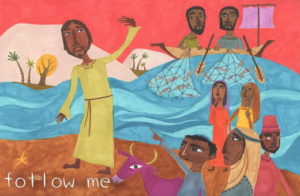 Christ’s passage through death and resurrection manifests itself in that, despite the great quantity of fish taken, the net did not break after the resurrection , whereas it did before the resurrection. At the time of the first miraculous catch of fish, Jesus had said to Simon Peter: “Do not be afraid; henceforth you will be catching men.” The Lord thus compared men and women, of all races and nations, to the fish that Peter had just caught. This comparison was such that, from the earliest years of Christianity, the symbol of the fish was the secret means of signifying one«s membership in Christ. From age to age, this comparison would endure, even in the name of the ring used by the Pope to seal his decrees and ordinances: the Ring of the Fisherman.
Christ’s passage through death and resurrection manifests itself in that, despite the great quantity of fish taken, the net did not break after the resurrection , whereas it did before the resurrection. At the time of the first miraculous catch of fish, Jesus had said to Simon Peter: “Do not be afraid; henceforth you will be catching men.” The Lord thus compared men and women, of all races and nations, to the fish that Peter had just caught. This comparison was such that, from the earliest years of Christianity, the symbol of the fish was the secret means of signifying one«s membership in Christ. From age to age, this comparison would endure, even in the name of the ring used by the Pope to seal his decrees and ordinances: the Ring of the Fisherman.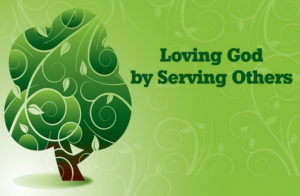 Jesus announces to Peter that he will die crucified, like him. But what does this matter? Jesus is with him! The risen Jesus lives and remains in him, through his Holy Spirit! Already, throughout his life, Peter carries his cross and dies each day upon that wood of torment, but it is in the joy that comes from the Spirit that he fulfills the task entrusted to him by the Lord: that of being a fisher of men! It is true that it is a heavy burden, but what a noble and glorious one!
Jesus announces to Peter that he will die crucified, like him. But what does this matter? Jesus is with him! The risen Jesus lives and remains in him, through his Holy Spirit! Already, throughout his life, Peter carries his cross and dies each day upon that wood of torment, but it is in the joy that comes from the Spirit that he fulfills the task entrusted to him by the Lord: that of being a fisher of men! It is true that it is a heavy burden, but what a noble and glorious one!Living with the entire Church, and in particular with Peter and the Apostles, the Most Blessed Virgin Mary is there to help all who are her children! If Christ is here, in our presence, with his Spirit, then why would not Mary, She who is the Bride of the Holy Spirit, also be mysteriously present, with us and among us? Let us fervently pray to her, in order that the grace of the Resurrection of the Lord might be poured out to an ever greater extent upon the Church and upon the whole world!
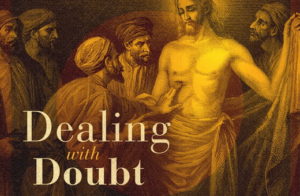 Jesus twice said to his disciples: “Peace be with you!” The Lord did not come to earth to punish us: it is only at the end of time that he will return to earth to judge all men, rewarding the just, and punishing the guilty. But for now, we are in the time of mercy! Now is the time of peace and reconciliation! Or, at least, it is for all those who truly desire the peace and mercy of God. For if Jesus came to reconcile all in him, he nonetheless allows us to freely receive or refuse the grace of his forgiveness. This grace is always offered to us. Moreover, the Lord gave the Apostles, on the evening of Easter, the gift of the Holy Spirit in order that, from age to age, from generation to generation, the forgiveness of God might always be available in the Church. This forgiveness is what we call the sacrament of penance, or reconciliation.
Jesus twice said to his disciples: “Peace be with you!” The Lord did not come to earth to punish us: it is only at the end of time that he will return to earth to judge all men, rewarding the just, and punishing the guilty. But for now, we are in the time of mercy! Now is the time of peace and reconciliation! Or, at least, it is for all those who truly desire the peace and mercy of God. For if Jesus came to reconcile all in him, he nonetheless allows us to freely receive or refuse the grace of his forgiveness. This grace is always offered to us. Moreover, the Lord gave the Apostles, on the evening of Easter, the gift of the Holy Spirit in order that, from age to age, from generation to generation, the forgiveness of God might always be available in the Church. This forgiveness is what we call the sacrament of penance, or reconciliation. How then can Thomas be the sign of the mercy of God if we are not similar to him? Quite simply, because we can see the Lord Jesus without seeing him. A paradox? Yes, but the Gospel is full of paradoxes. What enables us to see the Lord? The answer is simple: our baptism! Let us recall what took place during the baptism of Saul, he who persecuted the Christians, but who would become the Great Apostle to the Nations: Saint Paul. “Ananias departed and entered the house. And laying his hands on him he said, «Brother Saul, the Lord Jesus who appeared to you on the road by which you came, has sent me that you may regain your sight and be filled with the Holy Spirit.» And immediately something like scales fell from his eyes and he regained his sight. Then he rose and was baptized.”
How then can Thomas be the sign of the mercy of God if we are not similar to him? Quite simply, because we can see the Lord Jesus without seeing him. A paradox? Yes, but the Gospel is full of paradoxes. What enables us to see the Lord? The answer is simple: our baptism! Let us recall what took place during the baptism of Saul, he who persecuted the Christians, but who would become the Great Apostle to the Nations: Saint Paul. “Ananias departed and entered the house. And laying his hands on him he said, «Brother Saul, the Lord Jesus who appeared to you on the road by which you came, has sent me that you may regain your sight and be filled with the Holy Spirit.» And immediately something like scales fell from his eyes and he regained his sight. Then he rose and was baptized.”Let us thank the Lord for his infinite mercy! Let us thank Him for our baptism, which allows us to see him already, thanks to the virtues that this sacrament brings us: faith, hope, and charity! Faith remains, and until the end, it will remain our everyday companion. But in the end, there will remain only love! For, in the beginning, love was already present. First the Love of God, that powerful and irresistible Love. Then our own love, that love which could only be founded on the love of God and which was the motive force and the energy which led us to baptism, that unique baptism in the death of Christ! “Jesus did many other signs in the presence of the disciples, which are not written in this book; but these are written that you may believe that Jesus is the Christ, the Son of God, and that believing you may have life in his name.”
 The message of Easter is first communicated by the empty tomb. The death of Jesus was an observable and observed fact by both friends and enemies. No one saw the resurrection. It did not involve resuscitation of a corpse.
The message of Easter is first communicated by the empty tomb. The death of Jesus was an observable and observed fact by both friends and enemies. No one saw the resurrection. It did not involve resuscitation of a corpse.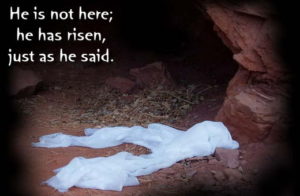 How are we to share in all of this? In the reading from 1 Corinthians today we are reminded how at the Jewish Passover the Jews were expected to throw out all the old, leavened bread and to prepare new, unleavened bread. The fermentation caused by the leaven, the yeast, was seen as a kind of corruption. As Paul says, “You must know how even a small amount of yeast is enough to leaven [i.e. corrupt] all the dough”. (Remember the parable Jesus told about a small amount of leaven penetrating the whole batch of dough?)
How are we to share in all of this? In the reading from 1 Corinthians today we are reminded how at the Jewish Passover the Jews were expected to throw out all the old, leavened bread and to prepare new, unleavened bread. The fermentation caused by the leaven, the yeast, was seen as a kind of corruption. As Paul says, “You must know how even a small amount of yeast is enough to leaven [i.e. corrupt] all the dough”. (Remember the parable Jesus told about a small amount of leaven penetrating the whole batch of dough?)It is a time to recommit ourselves to the meaning of our Baptism and Confirmation. We need to remember that as we break and share together the unleavened bread of the Eucharist, we share the Body of Christ, and that body embraces both Jesus and the whole community.
 In a way the real key to Holy Week is given in today’s Second Reading, which seems to be a hymn, incorporated by Paul in his letter to the Christians at Philippi, in northern Greece. It expresses the “mind,” the thinking of Jesus, a “mind” which Paul urges us to have also if we want to identify fully with Jesus as disciples. “Let the same mind be in you that was in Christ Jesus.” The key word in the passage is “emptied.” This kenosis (kenwsis), or emptying, is at the heart of Jesus’ experience during his Passion.
In a way the real key to Holy Week is given in today’s Second Reading, which seems to be a hymn, incorporated by Paul in his letter to the Christians at Philippi, in northern Greece. It expresses the “mind,” the thinking of Jesus, a “mind” which Paul urges us to have also if we want to identify fully with Jesus as disciples. “Let the same mind be in you that was in Christ Jesus.” The key word in the passage is “emptied.” This kenosis (kenwsis), or emptying, is at the heart of Jesus’ experience during his Passion.We are now – hopefully ¬¬– prepared for listening to Luke’s version of the Passion of Jesus, up to but excluding the climax of resurrection.
There is: – the last meal of Jesus with his disciples, a bitter-sweet experience for all – Jesus’ struggle with fear (even terror) and loneliness in the garden, ending in a sense of peace and acceptance – Peter’s denial of ever having known Jesus, the same Jesus with whom he had just eaten and who had invited him into the garden – the kiss of Judas, another disciple, sealing the fate of Jesus, and leading to bitter remorse and suicide – the rigged trial before the religious leaders and again before the contemptuous, cynical Pilate, the brief appearance before the superstitious and fearful Herod – the torture, humiliation and degradation of Jesus – the way of Calvary – the weeping women, the reluctant Simon of Cyrene – the crowds, so supportive on Sunday, who now laugh and mock – the murderous gangster promised eternal happiness that very day
The drama is truly overpowering and needs really to be absorbed one incident at a time. It would be worth reflecting in which of these scenes I can see myself, with which characters I can identify as reacting in the way I probably would.
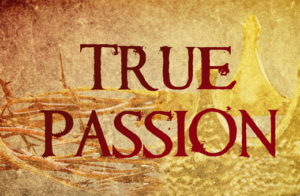 Jesus, for his part, does not strike back, he does not scold, he does not accuse or blame. He begs his Father to forgive those who “do not know what they are doing.”Jesus seems to be the victim but all through he is, in fact, the master. He is master of the situation because he is master of himself.
Jesus, for his part, does not strike back, he does not scold, he does not accuse or blame. He begs his Father to forgive those who “do not know what they are doing.”Jesus seems to be the victim but all through he is, in fact, the master. He is master of the situation because he is master of himself.If we are to be his disciples, he invites us to walk his way, to share his sufferings, to imitate his attitudes, to “empty” ourselves, to live in service of others – in short, to love others as he loves us. This is not at all a call to a life of pain and misery. Quite the contrary, it is an invitation to a life of deep freedom, peace and happiness. If it were anything else, it would not be worth considering.
 Who is without sin? Who has never failed in his duty as a son or daughter towards his spiritual father, the Pope? Nobody is perfect. Even the pope is not perfect: he is only the image, the half-visible resemblance of the one Father who is perfect and who reigns in Heaven! But this does not take away from the fact that we are all his sons or daughters if we proclaim our faith in God the Trinity. For Jesus himself declared that the Spirit of the Father was in Simon Peter, the first pope. “Flesh and blood has not revealed this to you, but my father who is in heaven.” Now, in the person of the pope, it is Simon Peter’s own authority that is exercised and which we are called to recognize…
Who is without sin? Who has never failed in his duty as a son or daughter towards his spiritual father, the Pope? Nobody is perfect. Even the pope is not perfect: he is only the image, the half-visible resemblance of the one Father who is perfect and who reigns in Heaven! But this does not take away from the fact that we are all his sons or daughters if we proclaim our faith in God the Trinity. For Jesus himself declared that the Spirit of the Father was in Simon Peter, the first pope. “Flesh and blood has not revealed this to you, but my father who is in heaven.” Now, in the person of the pope, it is Simon Peter’s own authority that is exercised and which we are called to recognize… he time of grace has finally arrived: “When he came to himself…” The grace of conversion makes this young man understand what it is to be a son, and consequently, what it is to be a father; for there is no son without a father, and there is no father without a son… “I am no longer worthy to be called your son…” This is something that we too can say, with the grace of God: we not longer merit to be called your sons… For the grace of God is an interior light which enlightens us and shows us, on the one hand, the ugliness of our sin, and on the other hand, the beauty of He who is the supreme Good: God, Beauty par excellence!
he time of grace has finally arrived: “When he came to himself…” The grace of conversion makes this young man understand what it is to be a son, and consequently, what it is to be a father; for there is no son without a father, and there is no father without a son… “I am no longer worthy to be called your son…” This is something that we too can say, with the grace of God: we not longer merit to be called your sons… For the grace of God is an interior light which enlightens us and shows us, on the one hand, the ugliness of our sin, and on the other hand, the beauty of He who is the supreme Good: God, Beauty par excellence!The road back to God is sometimes long, and often difficult. But while we are still far away from God, if there is already in our soul a small spark which, through grace, sets aflame the love of God in us, then our Heavenly Father sees it immediately and, with his tender care, helps us to continue on our journey, all the way to him: “While he was yet at a distance, his father saw him and had compassion, and ran and embraced him and kissed him.” No, he who returns to God will not be disappointed: God is greater than our heart!
 Does God kill people?
Does God kill people?
 Does God love some people more?
Does God love some people more?
On the one hand, I need to realise that God always and everywhere loves me. But that love is only fully completed in me when I become a genuinely loving and caring person, one who loves both God and others in word and action. There is no need for us ever to be afraid of God. He will never directly punish us or the world around us. But we do have the choice to come closer to him, to experience that love he is reaching out to us, to open ourselves to that love or, like the Prodigal Son, go our own way, separate ourselves from him and wallow in the cesspools of life. The choice is up to us. God’s love is there for the taking. What are we waiting for?
 There are objects and people in our lives that we have become so accustomed to that we take them for granted. For example, we are so used to electricity that we assume that everything in our homes will always have the necessary power. And then a hurricane hits. And we lose power for hours. The refrigerator doesn’t work. You can’t cook anything unless you have an outdoor grill, not really useful in a rain storm. The air conditioner isn’t working, and its getting hot in the house. Worst still, there’s no TV, God forbid! The same thing with relationships. We are so accustomed to our loved ones always being at home that we enter into a bit of a shock when a child goes to college. Or far worse, someone we care for dies. Then we really feel rotten for taking their presence for granted.
There are objects and people in our lives that we have become so accustomed to that we take them for granted. For example, we are so used to electricity that we assume that everything in our homes will always have the necessary power. And then a hurricane hits. And we lose power for hours. The refrigerator doesn’t work. You can’t cook anything unless you have an outdoor grill, not really useful in a rain storm. The air conditioner isn’t working, and its getting hot in the house. Worst still, there’s no TV, God forbid! The same thing with relationships. We are so accustomed to our loved ones always being at home that we enter into a bit of a shock when a child goes to college. Or far worse, someone we care for dies. Then we really feel rotten for taking their presence for granted. 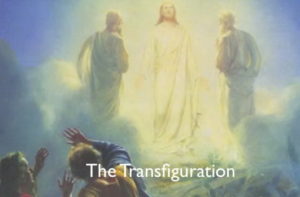 We have to nourish our spiritual lives, our relationship to God. We have to feed our spiritual life the food of union with God. The spiritual must conquer in our lives. If we become spiritual, then we can fulfill the call to evangelize the world.
We have to nourish our spiritual lives, our relationship to God. We have to feed our spiritual life the food of union with God. The spiritual must conquer in our lives. If we become spiritual, then we can fulfill the call to evangelize the world.On the Second Sunday of Lent we consider the way we are following the Lord. Do we allow ourselves to be exposed to the spiritual? Do we pray, really pray? Do we allow the spiritual to become real in our lives? Are we allowing God’s plan to take effect in our world? Are we living as citizens of heaven, or is our glory the mere external following of our religion? If someone were to ask any of us, “What exactly is a Catholic?” in what terms would we form our answer? If we were to answer the question in terms of religious practices, such as “a Catholic is a person who goes to Church on Sundays, receives the sacraments, says the Rosary, etc,” we would be giving far too much importance to what we do and not enough importance to what God is doing. However, if we were to answer the question, “What is a Catholic?” in terms of what God does, if we were to say, “A Catholic is someone united to God in such a way that others experience the Mystery of God working in him,” then it is God and his works that are the essence of lives. Few people are drawn to Catholicism because they want to do the things that Catholics do. People are drawn to Catholicism because they want to experience God as Catholics experience Him.
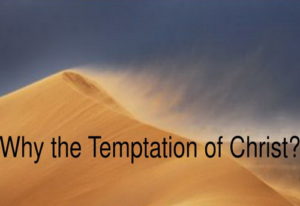 The world, the Kingdom that Jesus came to build, has a different set of values altogether. And it is those values we will be considering all during Lent. Many Christians are chasing the idols of wealth, status and power just as fanatically as their non-Christian brothers and sisters. But, in fact, these are non-Christian, even anti-Christian, ambitions. They are not the way of Jesus, they are not the way of the Kingdom, nor indeed are they the way to a fully human, fully satisfying life for anyone.
The world, the Kingdom that Jesus came to build, has a different set of values altogether. And it is those values we will be considering all during Lent. Many Christians are chasing the idols of wealth, status and power just as fanatically as their non-Christian brothers and sisters. But, in fact, these are non-Christian, even anti-Christian, ambitions. They are not the way of Jesus, they are not the way of the Kingdom, nor indeed are they the way to a fully human, fully satisfying life for anyone.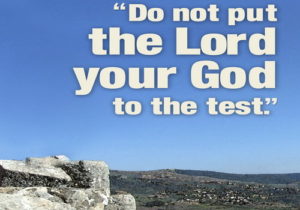 For us, too, the battle against evil never stops. The selfishness, the greed, the anger and hostility, the jealousy and resentment, above all the desire to have rather than to share, to control rather than to serve will continually dog us. We and our children are caught up in the competitive rat race without even knowing it. Our only success in life can be what we achieve in building not palaces or empires but in building a society that is more loving and just, based on the message of Jesus, a message of truth and integrity, of love and compassion, of freedom and peace.
For us, too, the battle against evil never stops. The selfishness, the greed, the anger and hostility, the jealousy and resentment, above all the desire to have rather than to share, to control rather than to serve will continually dog us. We and our children are caught up in the competitive rat race without even knowing it. Our only success in life can be what we achieve in building not palaces or empires but in building a society that is more loving and just, based on the message of Jesus, a message of truth and integrity, of love and compassion, of freedom and peace.That is why we need this purifying period of Lent every year. If, in past years, we let it go by largely unnoticed, let this year be a little different. Let it be a second spring in our lives. Let it mean something in our discipleship with Christ.
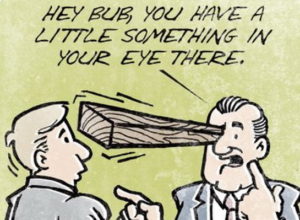 We have never seen Jesus, but we nonetheless believe in him, for, between his time and ours, there has been generation after generation of Christians, men and women, who, one after another, have faithfully transmitted to others, to everyone they met on the road of life, the message of Christ, who was sent to earth by the Father, in the Spirit. For nearly two thousand years, the same words of the Lord Jesus have been announced throughout the world by those who were chosen by Christ and who make up that great Mystery that is the Church!
We have never seen Jesus, but we nonetheless believe in him, for, between his time and ours, there has been generation after generation of Christians, men and women, who, one after another, have faithfully transmitted to others, to everyone they met on the road of life, the message of Christ, who was sent to earth by the Father, in the Spirit. For nearly two thousand years, the same words of the Lord Jesus have been announced throughout the world by those who were chosen by Christ and who make up that great Mystery that is the Church! Saint Paul reminds us of this by saying: “Do you not know that all of us who have been baptized into Christ Jesus were baptized into his death?” For, today, in the time of the New Covenant, it is no longer the blood of animals that is poured out upon the people, but, mysteriously, through the sacraments of faith, the elect of God are plunged, immersed, into the Blood of Christ, that is, into that element which is at once a sign of life and a sign of death, a sign of life when it is in the body, and a sign of death when it escapes from that same body.
Saint Paul reminds us of this by saying: “Do you not know that all of us who have been baptized into Christ Jesus were baptized into his death?” For, today, in the time of the New Covenant, it is no longer the blood of animals that is poured out upon the people, but, mysteriously, through the sacraments of faith, the elect of God are plunged, immersed, into the Blood of Christ, that is, into that element which is at once a sign of life and a sign of death, a sign of life when it is in the body, and a sign of death when it escapes from that same body.In order to be a teacher, like the Lord Jesus, one must therefore perfectly resemble he who is our model: one must be as pure as he is. Only then will we be allowed to remove the speck from our brother’s eye. As long as we have a log in our own eye – that is, as long as we do not do all we can to become perfect and holy, like our heavenly Father – we must renounce correcting our brother who, and we can believe this without hesitation, is more perfect than we are…
 Today’s Gospel follows what we read last Sunday. Jesus was speaking to us of true happiness: today he develops this topic, which is very dear to his heart, for he came into the world to teach us about nothing other than the happiness of Heaven, and to show us the way to achieve it by inaugurating on earth, already, the bliss of the elect of God.
Today’s Gospel follows what we read last Sunday. Jesus was speaking to us of true happiness: today he develops this topic, which is very dear to his heart, for he came into the world to teach us about nothing other than the happiness of Heaven, and to show us the way to achieve it by inaugurating on earth, already, the bliss of the elect of God. People have always mocked Christians for not behaving like everyone else… For here is something one hears quite often: “One must really be foolish to live according to precepts of the Gospel: ‘Love your enemies, do good, and lend without hoping to receive…” And, what is worse, it is not only non-Christians who speak this way: there are also Christians who thus criticize the Gospel. Would such people not be wolves who have entered the sheepfold?
People have always mocked Christians for not behaving like everyone else… For here is something one hears quite often: “One must really be foolish to live according to precepts of the Gospel: ‘Love your enemies, do good, and lend without hoping to receive…” And, what is worse, it is not only non-Christians who speak this way: there are also Christians who thus criticize the Gospel. Would such people not be wolves who have entered the sheepfold?Do you want to be happy by living according to the Gospel? To do so, one must be willing to appear foolish in the eyes of the world. That is how the Gospel is. Nothing or no one will ever change this. This is the way of the Cross, and only it leads to Resurrection in Christ. Is this madness? Those who do not love God say it is. In any case, if it is madness, it is a holy madness that leads to Heaven all the men and women who, like Saint Paul, followed the Christ who died and rose again: “For the word of the cross is folly to those who are perishing, but to us who are being saved it is the power of God.”
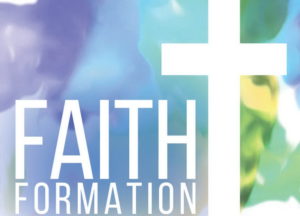 Jesus praises the poor in spirit, those who hunger for justice, those who weep, because they feel alone, without the wealth that would console them in this vale of tears, without the food that would make up for the injustice they have suffered… Assuredly, Jesus does not declare to be happy he to whom all good things flow – riches as well as friends and flatterers – but rather he who, through love of God and men, bears all these insults with faith, constancy and generosity. “Rejoice in that day, and leap for joy, for behold, your reward is great in heaven!”
Jesus praises the poor in spirit, those who hunger for justice, those who weep, because they feel alone, without the wealth that would console them in this vale of tears, without the food that would make up for the injustice they have suffered… Assuredly, Jesus does not declare to be happy he to whom all good things flow – riches as well as friends and flatterers – but rather he who, through love of God and men, bears all these insults with faith, constancy and generosity. “Rejoice in that day, and leap for joy, for behold, your reward is great in heaven!”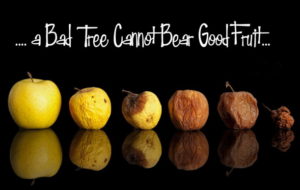 Jesus continuous to teach his disciples and, in his discourse, the word “happy” is now replaced by the word “woe”, “woe”, “woe”… There is no other word to describe the terrible reality of someone who does not follow the Way shown to us by the Master… What bitterness in these few words! Is the soul of the Lord not already filled with the repugnance he will feel on the eve of his Passion, in the garden of Gethsemane? Do we not already hear the cry of distress that Jesus shouted out on the cross of Calvary: “My God, my God, why hast thou forsaken me?”
Jesus continuous to teach his disciples and, in his discourse, the word “happy” is now replaced by the word “woe”, “woe”, “woe”… There is no other word to describe the terrible reality of someone who does not follow the Way shown to us by the Master… What bitterness in these few words! Is the soul of the Lord not already filled with the repugnance he will feel on the eve of his Passion, in the garden of Gethsemane? Do we not already hear the cry of distress that Jesus shouted out on the cross of Calvary: “My God, my God, why hast thou forsaken me?”We shall soon receive within us Jesus in his sacrament. That will be the best moment for us to ask him to make us truly happy, not as we understand it, according to our petty idea of “happiness”, but rather as the Lord wants us to share in that beatitude which is his for all eternity. May today’s Eucharist make us already resurrected!
 Jesus is in Galilee, on the shore of the lake of Gennesaret, that is, the Sea of Galilee. He teaches the people who are gathered there and who are captivated by the discourse they heard. “The people pressed upon Jesus to hear the word of God.” For what Jesus says inflames spirits and hearts, it fills the mind with many thoughts and with ever more numerous unanswered questions… Jesus proclaims eternal Life, that Life which belongs to the heavenly Father; the Holy Spirit, as his mission, is to bring that Life to germination and make it bear fruit in the souls of the men and women of all time!
Jesus is in Galilee, on the shore of the lake of Gennesaret, that is, the Sea of Galilee. He teaches the people who are gathered there and who are captivated by the discourse they heard. “The people pressed upon Jesus to hear the word of God.” For what Jesus says inflames spirits and hearts, it fills the mind with many thoughts and with ever more numerous unanswered questions… Jesus proclaims eternal Life, that Life which belongs to the heavenly Father; the Holy Spirit, as his mission, is to bring that Life to germination and make it bear fruit in the souls of the men and women of all time!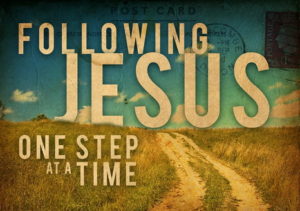 To Simon, Jesus’ command is truly surprising. Not only does Jesus not address spiritual words to Simon, but he gives him a command which goes against all he knows as a fisherman: Simon knows perfectly well that if he did not catch anything during the entire night, he will not catch anything now that the sun is up either… Truly, this is the summit of obedience! Jesus asks Simon to give up absolutely everything in order to do his will, the will of the Master of all things. But Simon received from Jesus a special grace and favor, that of his new name, which for him is already a power from on high… And Simon will cast the nets on the Lord’s command: “Master, we toiled all night and took nothing! But at your word I will let down the nets.”
To Simon, Jesus’ command is truly surprising. Not only does Jesus not address spiritual words to Simon, but he gives him a command which goes against all he knows as a fisherman: Simon knows perfectly well that if he did not catch anything during the entire night, he will not catch anything now that the sun is up either… Truly, this is the summit of obedience! Jesus asks Simon to give up absolutely everything in order to do his will, the will of the Master of all things. But Simon received from Jesus a special grace and favor, that of his new name, which for him is already a power from on high… And Simon will cast the nets on the Lord’s command: “Master, we toiled all night and took nothing! But at your word I will let down the nets.”Jesus reassures Simon in particular: “Jesus said to Simon, «Do not be afraid; henceforth you will be catching men.» ” From a fisher of fish, Peter becomes a fisher of men! What a noble mission! But it is also an intimidating one. For men and women cannot be treated like fish… So Jesus makes a point of reassuring Simon Peter: “Do not be afraid… ” Is it not fear that paralyses us and stops us from accomplishing marvellous things? For we who live in the twenty-first century are also, with Peter, with the Lord Jesus, called to be fishers of men. So may fear not be our counsellor! As Pope John Paul II said at the beginning of his pontificate, in October 1978: “Non abbiate paura!” “Do not be afraid!”
 The Gospel for this fourth Sunday of the year follows what we were reading last Sunday: Jesus is in Nazareth, his hometown, and he preaches in the synagogue. What the Lord is saying truly strikes his listeners, so much so that they are very surprised at the discourse given by someone they had once known and who, now, appears to them as another man, a man unlike any other, a man who surpasses all others, for, in fact, he is at once God and man: “They wondered at the gracious words which proceeded out of his mouth.”
The Gospel for this fourth Sunday of the year follows what we were reading last Sunday: Jesus is in Nazareth, his hometown, and he preaches in the synagogue. What the Lord is saying truly strikes his listeners, so much so that they are very surprised at the discourse given by someone they had once known and who, now, appears to them as another man, a man unlike any other, a man who surpasses all others, for, in fact, he is at once God and man: “They wondered at the gracious words which proceeded out of his mouth.” The Son of God came to earth and took on flesh in the womb of the Virgin Mary in order to save all men. But who has the greatest need for salvation? Is it not those who do not yet have any link to God, the True, the Only? The Jewish People had been elected by God to be his People: already, the fact of being Jewish established in them a certain link to God, a link of the corporeal order. Furthermore, he who was not Jewish lacked this link. But when the Son of God came to earth, he brought with him grace, a created divine good, which was capable of establishing between God and any man or woman a link of the spiritual order. “For the law was given through Moses; grace and truth came through Jesus Christ.”
The Son of God came to earth and took on flesh in the womb of the Virgin Mary in order to save all men. But who has the greatest need for salvation? Is it not those who do not yet have any link to God, the True, the Only? The Jewish People had been elected by God to be his People: already, the fact of being Jewish established in them a certain link to God, a link of the corporeal order. Furthermore, he who was not Jewish lacked this link. But when the Son of God came to earth, he brought with him grace, a created divine good, which was capable of establishing between God and any man or woman a link of the spiritual order. “For the law was given through Moses; grace and truth came through Jesus Christ.”In fact, the grace of God is destined for both the Jews and the pagan Nations. The first disciples of Christ, the Apostles, were all Jews. Jesus did not want to reject his People, but rather he wanted grace to dominate in them, he wanted the corporeal link they had with God to be dominated by a link of a higher order, a spiritual one, that of grace. If Elijah was sent to a widow of Zarephath, if Elisha cured Naaman the Syrian, it was to announce the coming of the long-hoped-for grace: that of the Messiah in person! Israel was being led by the Lord to understand that, from now on, spiritual grace was to dominate all that was corporeal in them.
